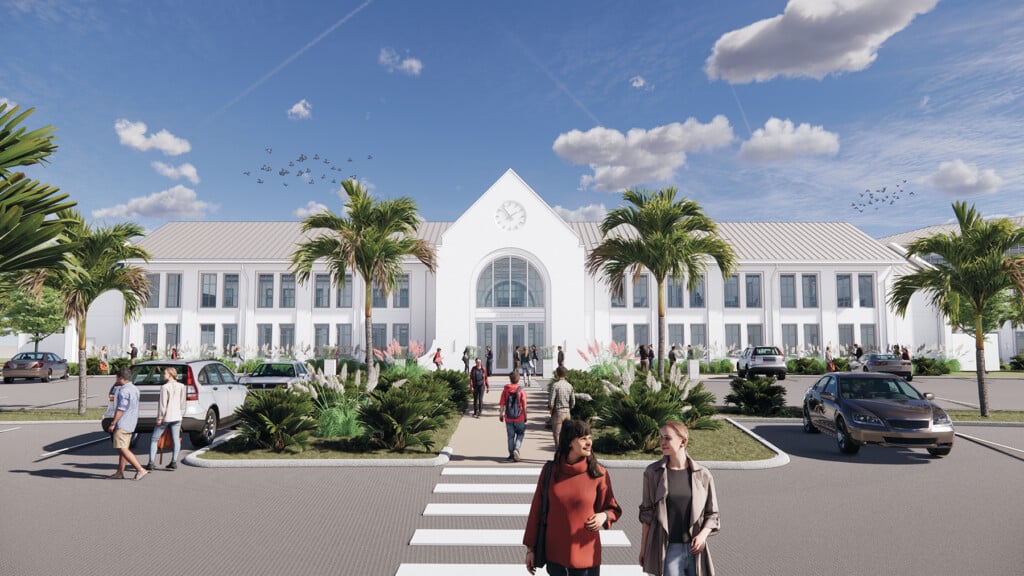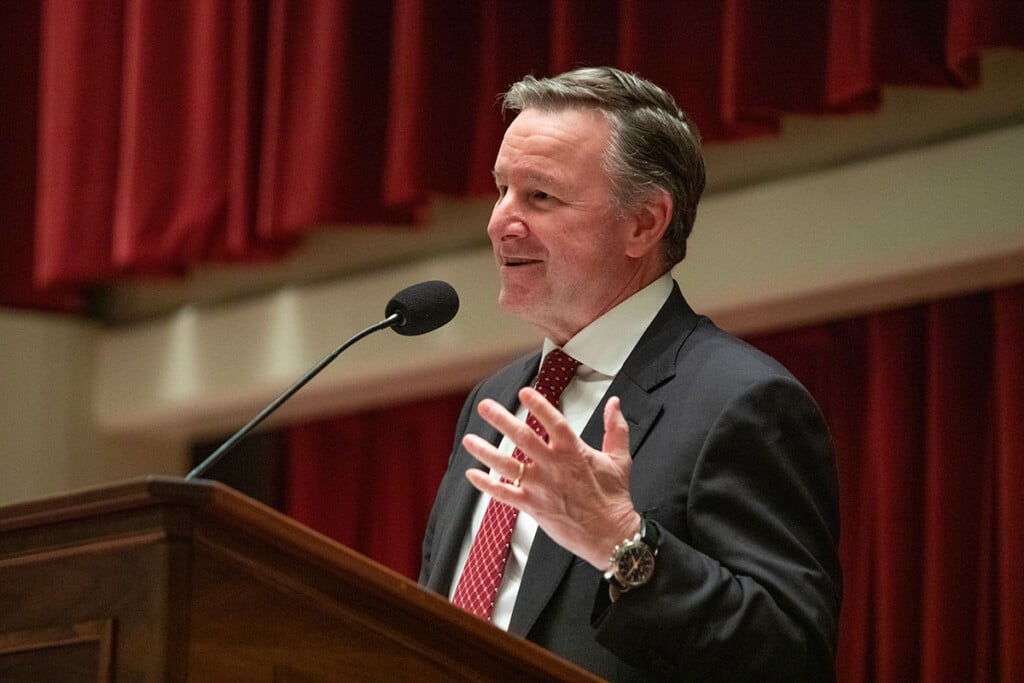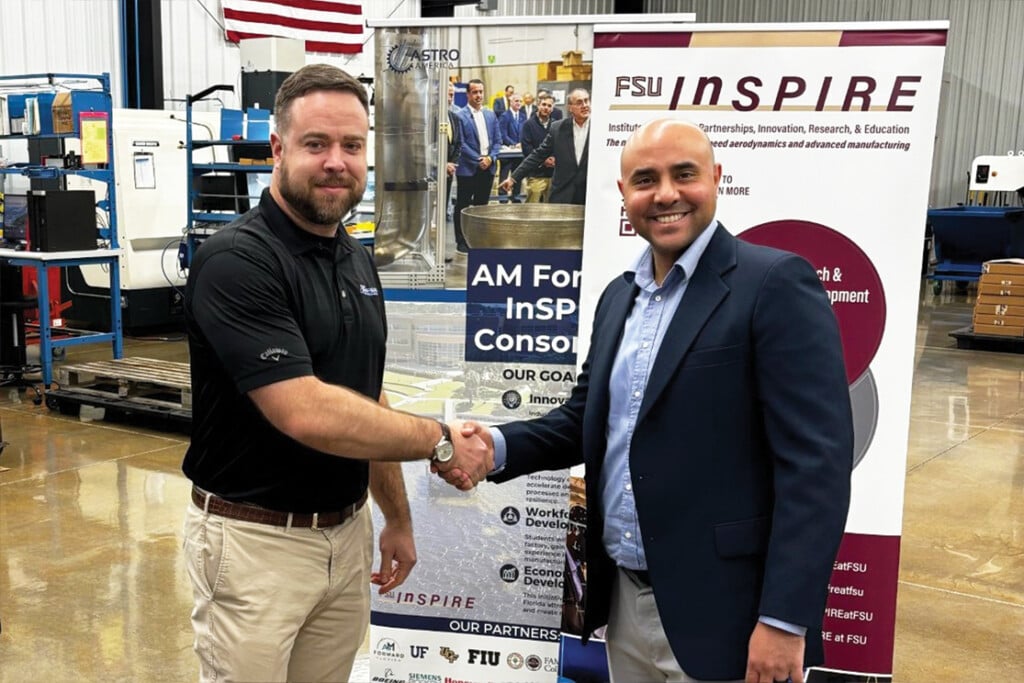Accelerating Success
Walton County collegiate high school sets students on a path progressing beyond academics

Raised during the age of the internet, millennials had a leg up on older generations in mastering all that the world wide web brought to the table. But generations Z and A are coming up during a new apex of technology where systems have evolved, and generative AI is now at everyone’s fingertips.
Comprehensive training will be essential for young learners to productively wield these new tools as they enter the workforce. School systems prioritizing new-tech initiatives will put students at a next-generation advantage.
“This year, we have to have a heavy focus on how to teach the students how to ethically use [generative] AI, how to use it as a thinking partner and a refinement tool,” says Tom Miller, executive director of The Seaside Schools, including Seacoast Collegiate High School.
Miller says Seacoast teachers will be pioneering instruction of generative AI systems at the South Walton charter school.
“Not everyone is all for this,” Miller says, “but it’s important that our kids learn how to use this so they can stay ahead of the game and not just use it as a glorified Google.”
Seacoast Collegiate High School seniors graduate with a diploma, an associate degree, and industry certifications. The school emphasizes an education based in workforce readiness and entrepreneurship.
“They’re going to be way more equipped than the traditional high school graduate when they leave us,” Miller says, explaining that the goal is “to expose our students and equip them for any path they choose.”
Seacoast is small but mighty. The ninth through twelfth grade charter school opened in 2013 with only nine classrooms and maintains a 10:1 educator to student ratio.
“We’re already out of space,” Miller says, “but when we have the Accelerator Building, that will be a big opportunity for us.”
Located directly off Highway 331, Seacoast shares a campus with Northwest Florida State College’s South Walton Center. Luckily, the campus left room for expansion.
In October 2023, Seacoast announced that $9 million in state funding and a $1 million contribution from the Glavine family would support efforts to expand. A three-phase project, named The Dream Big Project, will bring about three new buildings upon its completion. Two of those are open and functioning as of the start of the 2025-26 school year. A third Accelerator Building will serve as a workforce incubation center where training, mentoring, and collaboration can take place among students, community, and business leaders. Prior to additions, junior and senior students working on their collegiate courses had to commute to the Niceville NWFSC campus. The project’s new NWFSC Dual Enrollment Center will allow nearly 200 Seacoast junior and senior students to attend college courses on-site at the South Walton campus. The center will also be open to other area high school students and adult learners.
“In order for the Accelerator to work, we have to have all of the students on the actual campus,” Miller says. “The main purpose of the project was to eliminate the drive for South Walton high school students.”
The other new building will be designated for Seacoast freshmen and sophomores.
In the 2024-2025 school year, Seacoast educated around 300 students. That number will double with the new additions, opening capacity up to 600-700 students.
Opportunities will be further enhanced with the opening of the Accelerator Building. The building’s conference room alone will hold up to 200 seats. Miller says this will allow Seacoast to host more frequent keynote speakers and mentorship programs.
“The Accelerator Building will be a community building, which will be an ecosystem and a co-op for innovation and entrepreneurship,” Miller says. “It will have a workforce center; it will have a conference center; it will have a meetup space.”
Seacoast expects to break ground on the Accelerator Building by winter 2025. The project is approved for another $750,000 from the General Assembly state budget. In May 2025, The Seaside Schools announced $9.5 million in funding awarded through the Triumph Gulf Coast grant to expand career and technical education programming. The funding will help bring the Dream Big Project to completion.
This year, education expansions include new certification-awarding courses in AI, IT fundamentals, cyber security, and QuickBooks.
“They’ll be able to take those to wherever they go, if they go straight into the workforce, or if they go to college, it really sets them apart,” says Seacoast principal Drew Ward, “because these are certifications that industries will look for in hiring somebody.”
AI training will go beyond simply introducing students to the use of generative AI, such as ChatGPT.
“It actually goes into the coding aspect,” Ward explains, “so they’ll build their own GPTs. They’ll data mine their own data and come up with their own, like a Chat GPT.”
The school has also recently expanded its electives and extracurricular activities, including sports, arts, and theater. Seacoast students can also participate in teams and clubs at neighboring Walton County schools.
“We’ve brought in some significant experts in the field of STEM education, college and career advising, and AI,” Miller says. “We’re still recruiting cyber security, business leadership, and arts as well. We’ve already hired nine new staff this year, we hired four last year, and we’ll have another three or four next year.”
New staff members will assist in fostering mentorship and innovation initiatives with entrepreneurship programs, help to manage grant funding, and enhance STEM programs and AI training.
“Robotics clubs, engineering clubs, those will all be beefed up,” Ward says. “We do some of the underwater drones right now, and we have the Drones in Schools project, but we’re really going to beef those up this next year now that we have space and the experts in those fields that we’ve just hired.”
Dreaming big, Miller says, “There are no limits to our kids’ opportunities.”





